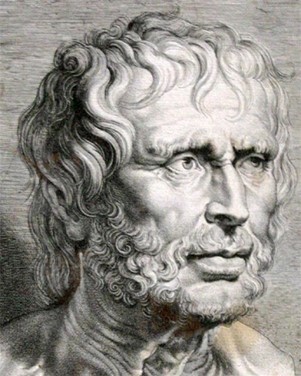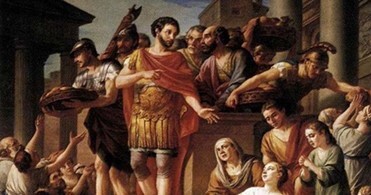|
Getting your Trinity Audio player ready...
|
As the world evolves, we may look to the past to gain insight into how we can navigate the present and shape our future. The famous stoic philosophers of ancient Greece and Rome are some of the most renowned thinkers in history, and their teachings continue to influence people in modern times.
With their emphasis on self-control, rational thinking, and living a virtuous life, Stoicism provides a framework for people to face adversity with resilience and grace.
Founders and famous stoic philosophers, Zeno of Citium, Cleanthes, and Chrysippus, were followed by Roman Stoics Seneca, Epictetus, and Marcus Aurelius. Then modern philosophers like Robertson, Pigliucci, and Holiday, continued the impact of Stoicism, which has spanned centuries.
Stoicism has had a profound influence on human thought and behaviour. And in this article, we explore the lives and teachings of the most famous Stoic philosophers of any time, and how they continue to inspire us to this day.
So, grab a comfortable seat, a hot cup of tea, and let’s travel through the world of Stoicism together.
Early Stoics
Stoicism was founded around 300 BC. For some historical context, this was about 50 years after Plato’s death.
The Founders of Stoicism
Zeno of Citium
Known as the father of Stoicism, Zeno of Citium is likely the most famous Stoic philosopher of all time. Zeno was heavily influenced by the philosophical school of Cynicism. As a student at Plato’s Academy, he was heavily influenced by the work of Plato and his contemporaries. Following in Plato’s footsteps, Zeno went on to establish an official school of Stoicism.
A common theme in some of the oldest philosophers, there remain no surviving works attributed to Zeno. While this is devastating for those of us who study his life and work, we are fortunate that his students, such as Diagones, have immortalised his work.
Stoicism is primarily categorised by emotional self-regulation and control, holding and acting with virtue, and acceptance. Zeno firmly held that all negative emotions stem from our inability to accept our lack of control of the outside world, and our attachments to things we cannot control. Desire, to the Stoics, is the root of unhappiness.
When we accept that we cannot control external things and events and let go of our attachments (that is everything from money and material possessions, to relationships and our youth), we can reduce suffering.
A less popularised aspect of Zeno’s Stoicism is the metaphysical part. Zeno argued that we exist in harmony with nature, and that the universe is interconnected. Zeno believed, God is present throughout the universe, an idea referred to as Pantheism.
Cleanthes
Cleanthes, a student of Zeno’s, was born around 330 BC; though records of his life are blurry. Born in Assos, he moved to Athens to study Stoicism under Zeno. Following Zeno’s death, Cleanthes became the head of the school of Stoicism that Zeno founded.
Cleanthes was more focused on the metaphysical than Zeno. Cleanthes was interested in matter and the soul, He held that the soul is an immortal material object. He emphasised our interconnectedness with nature. A Pantheist as well, he was responsible for injecting physics further into the Stoic tradition.
Moreover, Cleanthes argued that pleasure has no value, and our emotions are weaknesses.
Chrysippus
Chrysippus was born around 280 BCE. Following Cleanthes death, Chrysippus took over as the third head of the school of Stoicism.
It was Chrusippus who injected the idea of determinism into Stoicism. He argued that everything is fated, or pre-determined, by a logical series of cause and effect. This further solidified, as well as intensified, the Stoic idea that we have no control over external events.
Instead, the only thing we can control is our response to events, and how well we are able to flow with the external events that occur.
The Contribution and Influence of the Early Stoics
The early Stoics created and refined a philosophy that aims to support people in living a meaningful life, and in dealing with adversity. The work acted as a springboard for the many Stoic philosophers who would come after them.
Roman Stoics
In Rome, we see a resurgence of Stoicism, starting with Seneca, and going all the way up to the Emperor, Marcus Aurelius.
The Importance of Stoicism in Rome
When Stoicism was introduced to Rome, times were tough. War was a part of life, and on average, Romans did not live past their 30s. Stoicism is a philosophy that is particularly useful in difficult times, and it is no surprise that it was utilised in supporting Romans with traversing lives filled with hardship, loss, and fear.
3 most famous Roman Stoics
Seneca

Seneca was born around 4 BC and was a renowned Stoic philosopher. Originally from Spain, he moved to Rome and quickly assimilated, starting a career in politics. His philosophy was primarily based on virtue, reason, and self-control.
Portrait of Seneca
https://www.laphamsquarterly.org/contributors/seneca-younger
Seneca was a tutor and advisor to Nero, the Roman emperor. Nero, a notoriously corrupt and malevolent leader, would eventually force Seneca to take his own life.
While Zeno was interested primarily in reason and logic, Seneca was more focused on moral virtue. Where Zeno argued that emotions should be reasoned away, Seneca saw emotion as an inevitable part of being human. Seneca argued we should work to understand our emotions.
Epictetus
Epictetus was born in Ancient Greece in 55 CE, and was forced to move and live in slavery in Rome. He was freed after Nero’s death, when he began discussing Stoic teachings. It is not hard to see why philosophy was a desirable approach for Epictetus, given the circumstances of his life.
He focused on the self-regulation and control aspect of Stoicism. Discussing good and evil, he attributed all good to reason, and all evil to irrationality. He emphasised the Stoic idea that we should not be concerned about external things we cannot control.
Unfortunately, Stoicism, and philosophy in general, was not welcomed in the Roman Empire during Epictetus’ lifetime. So, he moved to Greece, where his philosophy made a great impact.
Marcus Aurelius

Marcus Aurelius was born in 121 AD. While he led his civilization through wars, economic challenges, as well as political unrest, he is well-remembered as one of the most famous stoic philosophers.
Painting of Marcus Aurelius by Joseph-Marie Vien
https://www.ancient-origins.net/history-famous-people/philosopher-king-ancient-rome-marcus-aurelius-imperium-009105
Marcus Aurelius’ book, Meditations, is one of the most read, studied, and admired works across any school of philosophy. In 12 separate parts, Marcus Aurelius discusses virtue, inner peace, living in accordance with nature. And he also emphasises self-discipline and control.
Modern Stoics
The Resurgence of Stoicism in Modern Times
Stoicism is an incredibly applicable philosophy that can be relevant and useful in any time and place. So, it isn’t surprising that it remains a popular philosophy in modern times, with philosophers such as Donald Robertson, Massimo Pigliucci, and Ryan Holiday continuing the Stoic tradition.
Modern Stoicism has become much more heavily influenced by (and an influence on) the field of psychology. Stoicism is often used as a self-help philosophy, and many modern philosophers have popularised Stoicism as a philosophy that can contribute to the improvement of mental health and well-being. In modern Stoicism, self-improvement and growth are even further emphasised than in previous iterations of the school of thought.
Most Famous Modern Stoic Philosophers
Modern philosophers have more ways than ever to reach an audience. Massimo Pigliucci, Donald Robertson, and Ryan Holiday are a few of the most noteworthy Stoics of the modern era.
Donald Robertson
Donald Robertson is a psychotherapist and one of the founding members of Modern Stoicism, a non-profit that merges the teachings of Stoicism with psychotherapy.
Unsurprisingly, Robertson uses Stoicism as a tool for improving mental health. His website includes blog posts and podcasts providing advice based on Stoic ideas and his psychotherapy training. He has a special interest in the work of Marcus Aurelius, as has authored books focused on his philosophy.
Massimo Pigliucci

Massimo Pigliucci is a modern Stoic who teaches philosophy at the City College of New York. He is a busy author, with many works that utilise stoicism as a strategy for happiness in the modern world.
Massimo Pigliucci
https://www.ccny.cuny.edu/profiles/massimo-pigliucci
Pigliucci is an atheist, and, like Zeno, is deeply influenced by Skepticism, and argues that a melding of Ancient Stoicism and Ancient Skepticism is the key to a good life. Pigliucci’s talk about using Stoicism as a philosophy for an ordinary life is a great example of Stoicism being utilised as a self-help tool.
Ryan Holiday
Ryan Holiday is another modern Stoic who utilises Stoicism as a self-help tool. His YouTube channel, Daily Stoic, has just over a million subscribers. There, he describes the Stoic ideas developed by the greats and how they can be applied to our lives. Holiday translates Stoic themes into advice that makes sense in modern times through videos such as The Best Stoic Insights On Raising Kids, 8 Stoic Habits That Will Improve Your Life, and How The Stoics Dealt With Anxiety (10 Strategies).
Holiday is also the author of several books about Stoicism, touching on themes such as ego, discipline, courage, and resiliency.
Comparing and Contrasting the Stoics
Since Zeno’s founding of Stoicism, Stoics have existed through just about every point in time. As the world has evolved and changed, Stoicism has evolved with it.
Common Themes and Principles
Across all variations and interpretations of Stoicism, most characteristics have remained consistent.
All forms of Stoicism maintain the idea that we should accept what we cannot change. All forms of Stoicism also maintain emphasis on virtue, particularly on moral virtue.
Stoicism has remained largely the same across all its iterations. Another commonality among all the Stoics we have discussed today is that they are responsible for spreading, popularising, and refining Stoicism during their time and place in the world.
Differences in Approach to Stoicism
Ancient, Roman, and Modern Stoicism all share a common core, there are some differences.
Modern Stoicism is more intertwined than ever with psychology and mental health. With so much access to easy-to-understand information online, the wisdom of the Stoics is at our fingertips. Some of the most popular videos on Stoicism have millions of views. The teachings of the most famous Stoic philosophers in history, such as Zeno, Seneca, and Marcus Aurelius, can now be disseminated to a much wider range of people.
Along the way, the metaphysical side of Stoicism that the early and Roman Stoics emphasised has become less of a focus. Though metaphysical concepts are still discussed, modern Stoicism has evolved to emphasise its practical applications. This decreased focus on the metaphysical is also due to a decrease in faith in the West, as well as a decrease in the number of religious philosophers.
Finally
The Stoic philosophers left an indelible mark on human thought and behaviour that transcends time and culture. From their emphasis on rational thinking and self-control to their teachings on living a virtuous life, the Stoics have provided a framework for individuals to face adversity with courage, resilience, and grace.
As we continue to navigate the complexities of modern life, the lessons of the Stoics remain as relevant today as they were centuries ago. We can look to the lives and teachings of Zeno of Citium, Seneca, Epictetus, and Marcus Aurelius, as well as the modern Stoics, for guidance on how to live a fulfilling life of purpose, integrity, and meaning.
The Stoics remind us that we have the power to control our thoughts, emotions, and actions, and that we can cultivate inner strength and wisdom to navigate life’s challenges. So let us embrace the Stoic philosophy and continue to seek inspiration from these great thinkers, as we strive to lead lives of virtue, wisdom, and joy.
It’s not what happens to you, but how you react to it that matters. – Epictetus
FAQs
Q1: Who were the founding philosophers of Stoicism?
A1: The three founding philosophers of Stoicism were Zeno of Citium, Cleanthes, and Chrysippus.
Q2: Who were the most famous Roman Stoic philosophers?
A2: The most famous Roman Stoics were Seneca, Epictetus, and Marcus Aurelius.
Q3: Who are some of the most famous modern Stoic philosophers?
A3: Some of the most famous modern Stoic philosophers include Donald Robertson, Massimo Pigliucci, and Ryan Holiday.
Q4: What are some of the key teachings of Stoicism?
A4: Some of the key teachings of Stoicism include the importance of self-control, rational thinking, and living a virtuous life.
Q5: Why is Stoicism still relevant today?
A5: Stoicism is still relevant today because it provides a framework for individuals to navigate life’s challenges with resilience, grace, and integrity. The teachings of the Stoics have continued to inspire people for centuries and have influenced countless individuals throughout history.

